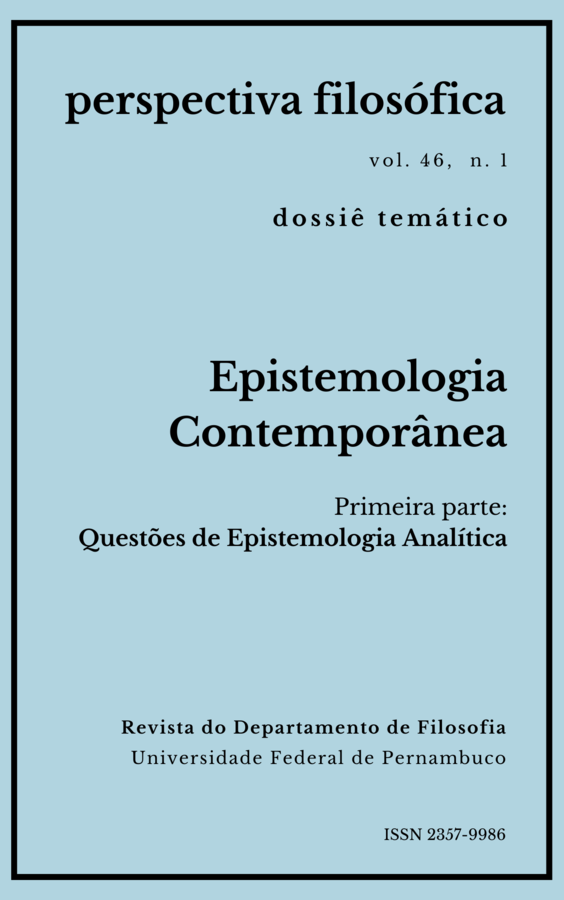Suspensão e neutralidade evidencial
DOI:
https://doi.org/10.51359/2357-9986.2019.247944Keywords:
suspended judgment, epistemic rationality, evidential neutralityAbstract
In this paper I discuss a certain thesis about the rationality of suspended judgment, to wit, that rational suspension requires evidential neutrality. After making some preliminary points about the probabilistic notion of evidential neutrality and evidential support, I direct the reader’s attention to an important consequence of these notions: that entailment by evidence makes for lack of neutrality. Next, I present an objection to the aforementioned thesis that deploys that consequence. There is a relevant concept of epistemic rationality, however, that makes the thesis immune to that objection. Finally, I will make some points about the functional role and instrumental value of suspended judgment. These points allow us to explain what is the positive value of suspending judgment about the truth of a given proposition even when the subject’s evidence completely settles whether that proposition is true or false.References
ARCHER, Avery. Wondering about what you know. Analysis, v. 78, n. 4, p.596–604, 2018.
EARMAN, John. Bayes or Bust? A Critical Examination of BayesianConfirmation Theory. Cambridge, Massachusetts: MIT Press, 1992.
EDER, Anna-Maria A. Evidential Probabilities and Credences. The BritishJournal For The Philosophy Of Science, no prelo.
FELDMAN, Richard; CONEE, Earl. Evidentialism. Philosophical Studies,v. 48, n. 1, p. 15–34, 1985.
FRIEDMAN, Jane. Suspended Judgment. Philosophical Studies, v. 162, n.2, p. 165–181, 2013.
FRIEDMAN, Jane. Why Suspend Judging? Noûs, v. 51, n. 2, p. 302–326,2017.
HÁJEK, Alan. What Conditional Probability Could Not Be. Synthese, v.137, p. 273–323, 2003.
MAHER, Patrick. Confirmation Theory. In: DONALD M. BORCHERT(Ed.). The Encyclopedia of Philosophy. 2nd. ed. [s.l.] : Macmillan, 2005.
RALEIGH, Thomas. Suspending is Believing. Synthese, [no prelo].
SALMON, Nathan. Illogical Belief. Philosophical Perspectives, v. 3, p.243–285, 1989.
STAFFEL, Julia. Credences and suspended judgments as transitionalattitudes. Philosophical Issues, v. 29, p. 281–294, 2019.
STURGEON, Scott. Confidence and coarse-grained attitudes. In:GENDLER, T. S.; HAWTHORNE, J. (Eds.). Oxford Studies inEpistemology, volume 3. Oxford: Oxford University Press, 2010.
WEDGWOOD, Ralph. The aim of belief. Philosophical Perspectives, v. 36,n. 16, p. 267–297, 2002.
WILLIAMSON, Timothy. Knowledge and its Limits. Oxford: OxfordUniversity Press, 2000.
Downloads
Published
Issue
Section
License
A Revista Perspectiva Filosófica orienta seus procedimentos de gestão de artigos conforme as diretrizes básicas formuladas pelo Conselho Nacional de Desenvolvimento Científico e Tecnológico (CNPq). http://www.cnpq.br/web/guest/diretrizesAutores que publicam nesta revista concordam com os seguintes termos:
Os autores mantém os direitos autorais e concedem à revista o direito de primeira publicação, sendo o trabalho simultaneamente licenciado sob https://creativecommons.org/licenses/by/4.0/deed.pt_BR que permite o compartilhamento do trabalho com reconhecimento da autoria e publicação inicial nesta revista.
Os autores têm autorização para assumir contratos adicionais separadamente, para distribuição não-exclusiva da versão do trabalho publicada nesta revista, com reconhecimento de autoria e publicação inicial nesta revista (Consultar http://opcit.eprints.org/oacitation-biblio.html).

Esta revista está licenciada com uma Licença Creative Commons Atribuição 4.0 Internacional.













